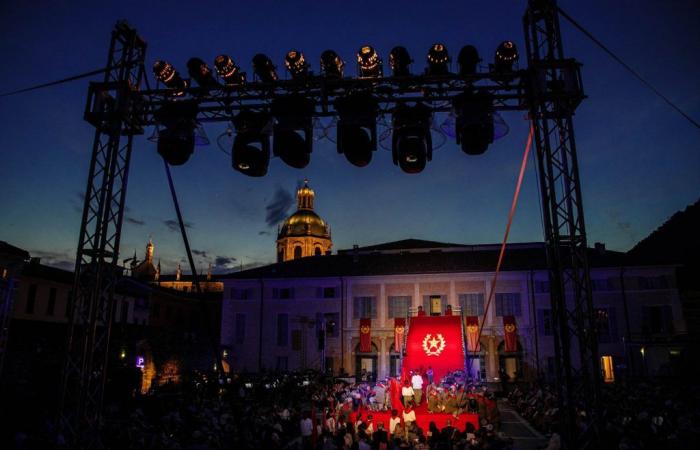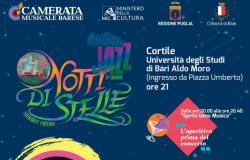Como, Arena del Teatro Sociale, XVII Como City of Music Festival
“TURANDOT”
Lyric drama in three acts with a libretto by Giuseppe Adami and Renato Simoni.
Music by Giacomo Puccini
Turandot HANYING TSO
Prince Calaf MAX JOTA
Timur BAOPENG MONEY
Liu ALESSIA MEREPEZA
Emperor Altoum DAVIDE CAPITANIO
Ping JUNYEOK PARK
Pong LORENZO MARTELLI
Pang RAFFAELE FEO
A mandarin FRANCESCO THE GATTUTA
Orchestra 1813
Coro 200.Com
Children’s Voices of the Social Theatre
Director Jacob Brusa
Choirmaster Max Fiocchi Malaspina con David Dell’Oca, Eric Foster, Arianna Lodi, Cristina Merlini
Direction and Lights Valentina Carrasco
Scenes and Costumes Mauro Tinti
New Production Teatro Sociale di Como AsLiCo
Como, 27 June 2024
As every year, it is with pleasure that we go to the Arena del Teatro Sociale di Como for the project of 200.Coman amateur choir of more than two hundred people who prepare an opera for a year, followed by the Masters of the city theater. It is sad to note, however, that this worthy project of musical education has probably gotten out of hand: this year, for the staging of “Turandot”, a notable choral group found itself arranged along a long catwalk for the entire first act, in fact unable to see the assistant teachers and the director, and probably for this reason with evident problems of cohesion, rhythm and intonation. For next year, scaling everything down could help to find the polish we have enjoyed in other Como summers. Also because, inevitably, the entire production of this “Turandot” reaches very demanding levels, from every point of view, and therefore the limits emerge more. Starting from the concertation of Jacopo Brusait is difficult to make an assessment, since theensemble that he finds himself conducting is dramatically reduced compared to the demands of the score, and, although microphoned, it is difficult to enjoy a homogeneous sound – and the suspicion is that just as we could not hear it, the choir could not hear the orchestra well either. With the singers this problem arises to a lesser extent: they all show off a great scenic propensity and a greater confidence in the work, as well as markedly more set voices. The cast is certainly dominated by Hanying Tso (Turandot): an imposing voice, but also capable of bending over beautiful phrasing, rich in harmonics and not at all two-dimensional, which has evidently been practiced on our repertoire for a long time. He looks good next to her Max Jotaa Brazilian tenor with an interesting color, capable of displaying an appreciable vocal expressiveness and confidence in the entire texture of the role. Ppity for the excessive caution on “Nessun dorma” which made it a bit generic – but without any slips. However, those who stole the scene from the protagonists were Ping (Junyeok Park), Pong (Lorenzo Martelli) and Pang (Raffaele Feo), three solid voices, perfectly distinct and equally blended, with calibrated sounds and beautiful colors (light Feo, more robust and round Martelli, not too dark and pleasantly worn Park): their arrival always brings a breath of freshness, exactly as was intended by Puccini; the young man also shows off a very solid burnished voice Baopeng Wang in the role of Timur, played without a flaw, while a more alternating performance offers Alessia Merepeza (Liù): the first act was uncertain, the difficult “Signore Ascolta” showed its flank to some emission problems. The situation improves in the third act, where, either because of the character’s character, or because of the artist’s greater ease, we hear a scene and an aria very well interpreted, with a voice rich in harmonics and naturally velvety, which sees in “Tu che di gel sei cinta” one of the highest points of the evening. Altoum’s two secondary roles were also well interpreted (Davide Capitanio) and Mandarin (Francesco The Catwhich is also distinguished by singular stage force). The direction of Valentina Carrasco It’s exactly what we would expect: we have a very powerful political contextualization (contemporary post-Maoist China or North Korea), scenes of crude realism (the torture of Calaf during the riddles, with his head crushed in a bucket full of water), the demystification of the iconic (the beating of the population during “Nessun dorma”). All things that we have already seen in the Argentine director’s productions; here, however, we also find some rather interesting developments within the plot, starting from Calaf’s fetishism for the figure of Turandot (enlarged on a banner in which the Prince lewdly rolls around) and arriving at the rightly chilling scene of the souls of the dead, played by deported to communist re-education camps, who with blood from their ears, punitive signs around their necks and walking askew, roll down the steps on which the portrait of the princess stands. Chills, for a thrilling scene, which generally passes between one carousel and another of the first act. Even the use of children’s voices, in perfect regime style, complete with flags and banners, is perfect and chilling, as is the description of Ping, Pong and Pang as government officials covered in paperwork, grotesque and equally accurate. In short, Carrasco with this courageous staging shows us that updating is possible, as long as the original intentions and narrative directions are maintained. Let’s hope other colleagues of yours understand this too. Photo Andrea Butti
For Latest Updates Follow us on Google News






